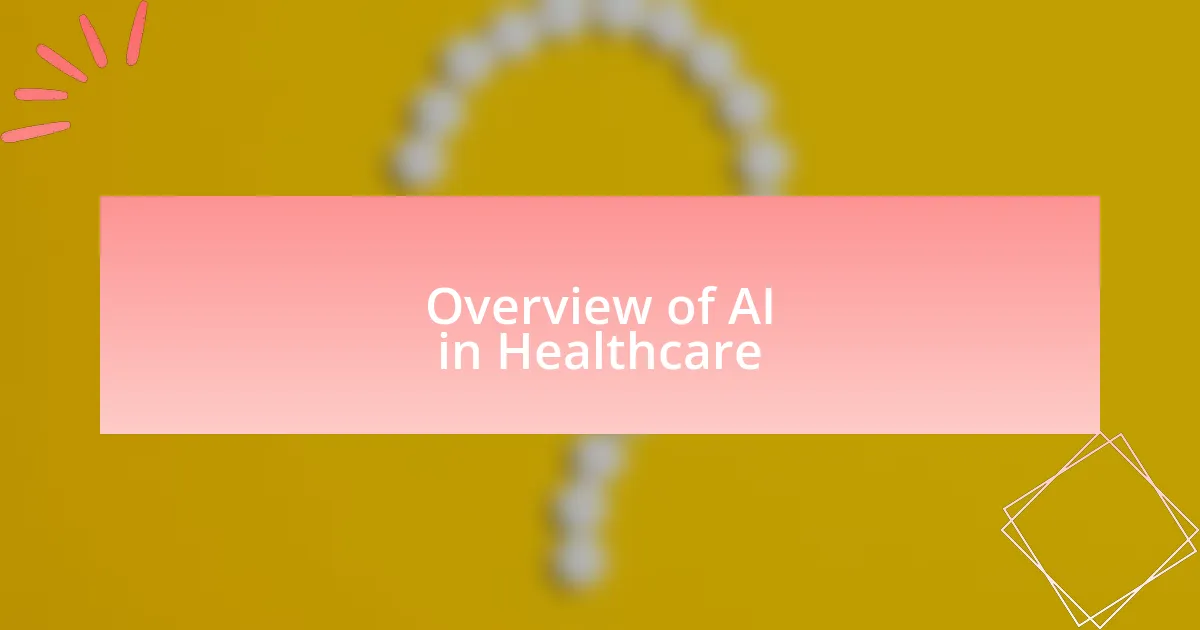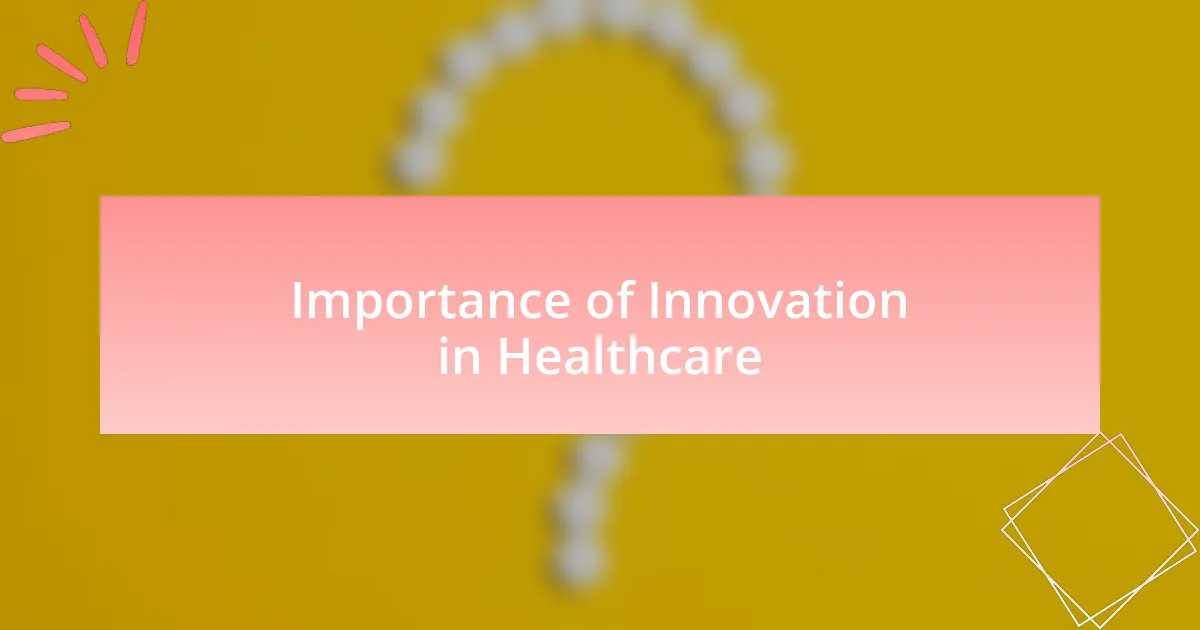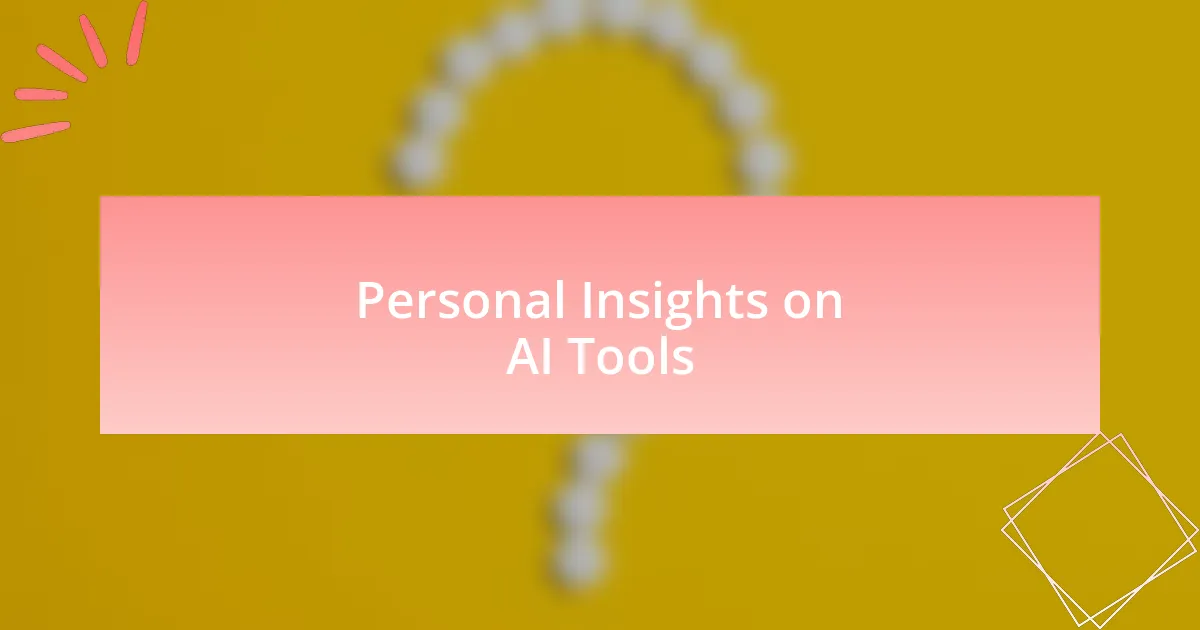Key takeaways:
- AI improves diagnostic accuracy and speeds up assessments, enhancing emergency healthcare.
- Predictive analytics allows for early identification of health risks, enabling preventive care.
- Innovation in healthcare fosters collaboration and enhances patient experiences through tailored solutions.
- AI streamlines administrative tasks, allowing healthcare professionals to focus more on patient care.

Overview of AI in Healthcare
Artificial Intelligence (AI) is transforming healthcare in unprecedented ways. I remember my first encounter with AI-driven diagnostic tools; they not only sped up the assessment process but also added a layer of accuracy that was hard to ignore. How many times have you wished for quicker test results during a medical emergency? With AI, that wish is becoming a reality.
One significant area of AI in healthcare is predictive analytics, which helps in anticipating patient outcomes. I often think about how this technology could change the landscape of preventive care. For instance, imagine a world where a patient’s potential health risks are identified before they even manifest; it could lead to early interventions that save countless lives.
Moreover, AI is reshaping patient engagement through personalized healthcare experiences. When I first saw an AI platform that adapted treatment plans based on a patient’s unique data, I was impressed by the potential for tailored care. Isn’t it exciting to think about how AI can create a more empathetic and responsive healthcare environment, ultimately improving patient satisfaction and health outcomes?

Importance of Innovation in Healthcare
Innovation in healthcare is crucial for addressing the complex challenges faced by the industry. I vividly recall a time when a friend of mine was misdiagnosed, leading to unnecessary treatments that could have been avoided with better diagnostic tools. This experience underscored for me how vital it is to embrace new technologies that improve accuracy, reduce costs, and enhance patient care.
Advancements in technology not only streamline processes but also empower healthcare professionals to make informed decisions. I often reflect on how telemedicine has changed my access to specialists. The ability to consult with a doctor from the comfort of my home has made healthcare more accessible and less intimidating—could there be anything better in a world where convenience is key?
Additionally, fostering a culture of innovation encourages collaboration among healthcare providers, researchers, and technologists. I’ve seen firsthand how interdisciplinary teams can develop solutions that tackle pressing issues, such as treatment adherence and patient education. Isn’t it inspiring to think about the collective potential to improve lives when diverse minds come together for a common goal?

Personal Insights on AI Tools
When I first encountered AI tools in healthcare, I was both excited and skeptical. I remember attending a conference where a speaker showcased an AI-driven platform that could predict patient deterioration. It blew my mind. I kept wondering, could this really outsmart human intuition? Over time, I’ve learned that while these tools can enhance accuracy, the human touch remains irreplaceable in patient care.
In my work, I’ve seen AI tools streamline administrative tasks that once consumed hours of our day. I recall a particularly hectic week at the clinic when we integrated an AI scheduling system. Suddenly, we could focus more on patient interactions rather than juggling appointments. It raised an important question for me: how do we balance the efficiency of technology with the personalized care that patients deserve?
There’s also something powerful about how data-driven insights can lead to significant breakthroughs in treatment plans. I’ve seen AI assist in analyzing trends for chronic disease management, which led to more tailored interventions for my patients. Reflecting on this, I can’t help but ask: how much more could we achieve if we fully embraced these innovations while remaining grounded in human compassion?